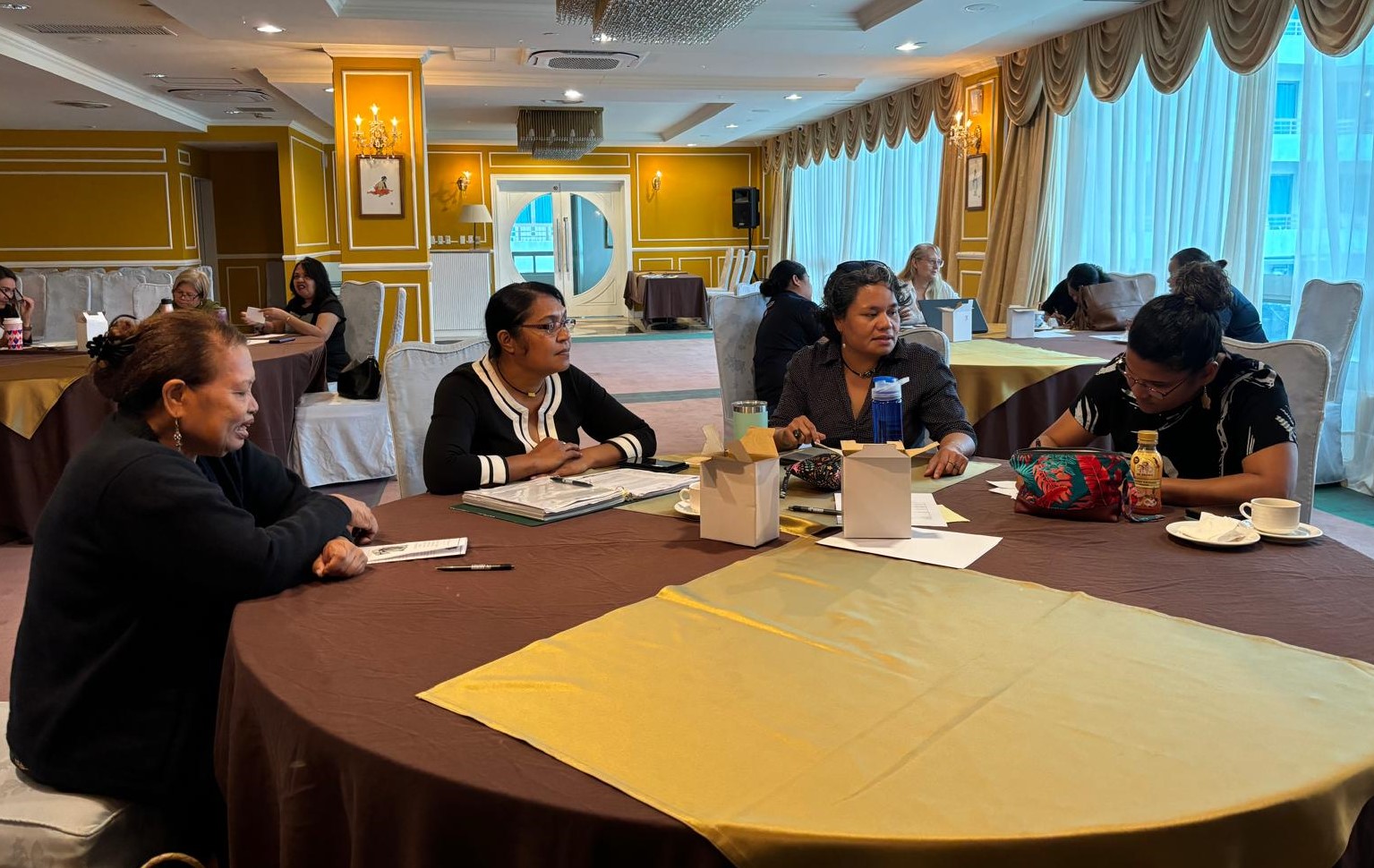Amplifying Women's Voices: Shaping Change Through Law and Justice in Palau
July 23, 2024

Participants of Palau's first awareness workshop on gender-based violence and legal literacy.
The UN Development Programme (UNDP) Governance Portfolio in the Fiji Multi-country Office, in partnership with the Micronesian Legal Services Corporation (MLSC), successfully conducted the first awareness workshop on gender-based violence and legal literacy in Palau. This event attracted participants from various sectors, including community leaders, Civil Society Organizations, and government representatives.
This workshop marks the beginning of a series under UNDP’s Gender Justice Initiative, which is deeply rooted in the commitment to promote human rights and gender equality as essential components of sustainable development. Through gender justice, governance systems and the rule of law are strengthened by ensuring that legal frameworks and policies are inclusive and equitable.
This includes promoting women's access to justice and legal services. Promoting gender justice also involves building the capacity of institutions to be more responsive to the needs of all genders. This includes training and sensitizing law enforcement, judiciary, and other stakeholders to gender issues. By addressing the specific needs and challenges faced by women and marginalized groups, gender justice ensures that development initiatives are more inclusive, leading to more effective and equitable outcomes.
This initiative focuses on community outreach, carefully tailoring perceptions and cultural nuances towards gender equality and addressing gender-based violence. The collaboration with MLSC and local organizations ensures a comprehensive and culturally sensitive approach. The workshop provided a platform for participants to engage in in-depth discussions, exploring the social dynamics between men and women that can lead to harmful attitudes and behaviors, thereby impacting their access to justice. Participants also learned about the existing legal avenues available for support.
Importantly, the workshop provided a safe space for participants to discuss various cultural elements that protect women and those that might enable a culture of silence. Participants expressed strong interest in a follow-up workshop, ideally spanning a full day.
Mila Makka Omei, Clerk from the Supreme Court, highlighted the value of the session stating, "The material was very informative with the methodology allowing us to interact and connect. It presented familiar concepts in a new way that prompted critical thinking and reflection. The workshop also facilitated networking and a better understanding of how we can collaborate with Micronesian Legal Services and UNDP. Additionally, it was grounded in and relatable to Palau's culture."

The workshop provided a safe space for participants to discuss various cultural elements that protect women and those that might enable a culture of silence
The last prevalence study by the Family Health and Safety Survey in 2014 elaborated by United Nations Population Fund revealed that one in every four women in Palau experiences some form of violence. Despite having systems in place, as noted by various stakeholders, there is still a critical need for increased awareness, capacity building, and institutional strengthening to embed values and structures that support survivors of domestic violence.
Palau faces challenges in providing access to justice for survivors of GBV due to various factors. Its unique dual governance system, which comprises modern governmental structures and traditional practices plays a significant role in shaping societal dynamics.
In traditional Palauan society, women are the primary decision-makers, and the modern government collaborates closely with traditional leaders to uphold these matrilineal values. However, participants expressed that the influence of colonization, immigration, social media, and a disconnection from traditional values have contributed to the rise of GBV in the country.
A significant issue is the under-reporting of violence by women, leading to the underutilization and inefficacy of existing support systems. Addressing this challenge requires overcoming cultural perceptions that view GBV as a colonial legacy rather than a present-day issue within Palauan society. Workshop participants identified cultural factors as both protective and risk factors, with a notable gap between traditional values and the younger generations.
Promoting gender justice in Palau involves bridging this gap and strengthening the connection to traditional values while adapting to modern influences. Enhancing the capacity of institutions to respond adequately to GBV through training and sensitizing law enforcement, judiciary, and other stakeholders is crucial. By ensuring that legal frameworks and policies are inclusive and equitable, we can improve access to justice for women and marginalized groups, ultimately leading to more effective and equitable outcomes in the fight against GBV in Palau.
Ron Ledgerwood, Directing Attorney from Micronesian Legal Services in Palau, commended UNDP stating that “the workshop was an invaluable opportunity to collaborate with women supporting victims of Gender-Based and Domestic Violence in Palau.”
“At MLSC Palau, we are committed to addressing the gaps in early-stage legal assistance for victims. Recognizing the efforts of the Palau Judiciary and Associate Justice Honora Remengesau Rudimch, we aim to further our support and continue learning from community leaders to enhance our impact,” Mr Ledgerwood added.
UNDP will continue to support community awareness workshops in Micronesia throughout the year. This continued effort underscores the importance of sustained engagement and capacity building to drive meaningful change. By encouraging open conversations, enhancing skills, and respecting cultural traditions, UNDP and its partners are dedicated to making society safer and fairer for everyone.
The next workshop is scheduled to be held on the island of Fefen in Chuuk with more than 70 community members expected to attend.

 Locations
Locations



